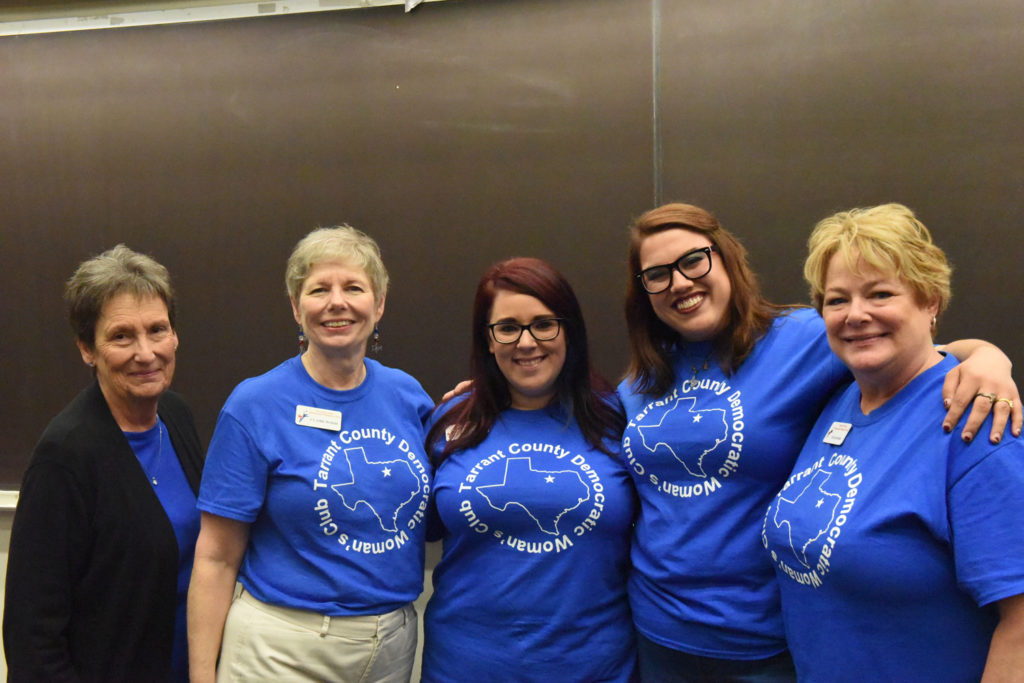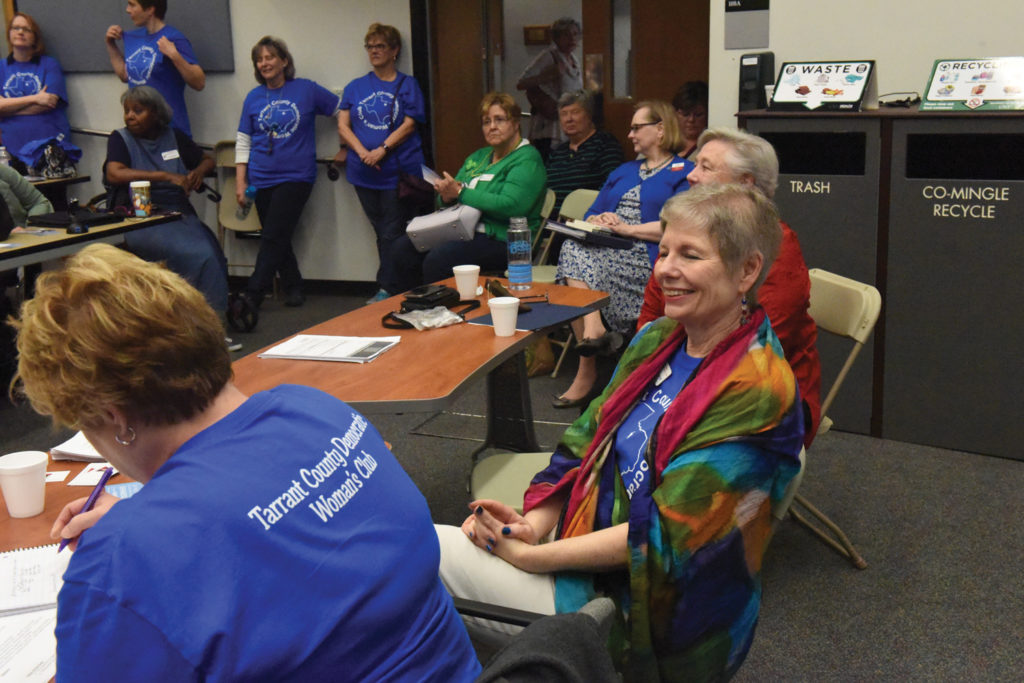For Veronica Penrod, it was a bittersweet experience, sitting inside the Blue Mesa Taco & Tequila Bar at DFW Airport with Vanessa Adia, munching on chips, salsa, and adobe pie. The “sweet” was that the two friends were about to board a plane for a weekend excursion. The “bitter” was that the television inside the café was tuned to the swearing in of Donald Trump as the nation’s 45th president.
The two Democrats used the same word to describe watching the inaugural ceremony: surreal.
“I was watching people around us just to kind of see what their reactions were,” said Penrod, 35, who works from her Fort Worth home as a creative director for a Chicago-based marketing agency. “I actually felt a little shocked because I felt that most of the people weren’t even paying attention. They were just going about their business.”

Although Trump had beat out more than a dozen other challengers to become the Republican Party’s unlikely nominee, pollsters nevertheless predicted that he would lose to Democrat Hillary Clinton in the general election. For many, Trump’s victory was made all the more shocking because of the 2005 Access Hollywood tape, leaked just weeks before the election, in which he bragged about grabbing women by the genitals. For many others, his victory was all but ensured by the FBI’s highly publicized discovery of new emails related to Clinton only days before the election. The messages proved to be worthless almost immediately, though the mere pairing of the words “Clinton” and “emails” ended up being enough to doom her campaign.
Though watching Trump become president felt like a strange dream to the friends, walking to the gate to catch their Spirit Airlines flight was “a completely different experience,” Penrod said.
“As we were getting closer, we started noticing pink hats,” she said, referring to the knitted caps with pussycat ears that had become a symbol of women’s resistance to the female genital grabber in chief and noted racist/xenophobe. “You could feel a different energy, more excited and positive.”
The friends suspected that virtually everyone at their gate was heading to Baltimore, Md., for the same reason: to participate in the next day’s Women’s March on Washington. Adia, who teaches sixth, seventh, and eighth grade science and is a department chair at Benbrook Middle-High School, said that in addition to a smattering of knitted pink caps, many of the women were wearing t-shirts and buttons with left-leaning political messages. At one point at the gate, she and Penrod invited anyone heading to the Women’s March to gather for a group photo. They happily obliged, and some of the few men on the flight helped out by using the women’s cell phones to snap photos for them. One of those photos was published by the Huffington Post.
“It was amazing,” said Adia, who is concerned, among other things, about Trump’s view of climate change and his rollbacks at the Environmental Protection Agency, now headed by Trump appointee Scott Pruitt, who sued the EPA 13 times as Oklahoma’s attorney general.
Aboard the plane, three female flight attendants welcomed the marchers and said that they planned to stay overnight in Baltimore to participate in the march themselves, said Penrod, who spent the flight crocheting her own pink cap with help from a woman seated next to her.
 “We were all strangers,” Penrod said, “but we didn’t feel like strangers at all.”
“We were all strangers,” Penrod said, “but we didn’t feel like strangers at all.”
Penrod, who has a husband and two sons, feels strongly about LGBTQ issues and has served on the board of the Fort Worth Gay Pride Parade. Until now, that was pretty much the extent of her political involvement.
For Adia, participating in the Women’s March was a new experience, but 2017 is shaping up to be a year full of them. In January, she joined her first political organization: the Tarrant County Democratic Woman’s Club, which has more than quadrupled its membership since the end of 2016. In March – the same month Penrod also joined the TCDWC – Adia filed with the Federal Election Commission to run against U.S. Rep. Kay Granger, a Republican who has represented the 12th Congressional District since 1997. Adia also volunteered to speak at the March for Science event at the UNT Health Science Center in Fort Worth on Earth Day, April 22.
Unlike Adia and Penrod, Cecilia Gonzales of Arlington didn’t participate in the Women’s March on Washington, or in any of the sister marches, because she was home suffering from a sinus infection and the flu. But she watched the televised coverage, wishing she could participate.
“As soon as I got better, I just had a fire in me to do something to fight the Trump agenda that I feel is taking the country backwards,” she said.
Gonzales contacted Indivisible, a grassroots organization viewed as the Democrats’ version of the Tea Party, and started an Arlington chapter. She holds monthly meetings at her family’s temporary employment company not far from AT&T Stadium.
Adia, Penrod, and Gonzales represent thousands of women locally and across the country who have become politically active, thanks to the outcome of the 2016 presidential election. Adding to their numbers are women who demonstrated in the 1960s and 1970s and thought their work was done – but that was before Trump came along.
In the words of TCDWC sergeant-at-arms Cindy James, who is also president-elect of Texas Democratic Women, a statewide organization with local chapters that promotes Democratic Party principles, Tarrant County was mostly Democratic back when she protested on behalf of women’s equality back in the 1960s and 1970s. But as she and other women began juggling careers and family responsibilities, they laid down their placards.
“We couldn’t do it then,” she said.
Bit by bit, election by election, Tarrant County began turning red. By the time Ronald Reagan was elected president in 1980, the county was staunchly Republican, James said, and it has been that way ever since.
Though Democrats in Tarrant County may be greatly outnumbered by those who disagree with their core values and principles, most would agree that Trump is a different type of Republican, at times turning on members of his own party. With Trump, many fear that intolerant attitudes that took decades to if not eradicate then at least shove into the shadows are now at risk of being normalized again. “I’m really kind of scared about what might come next,” Adia said.
Penrod said she is alarmed by Trump’s “hateful language,” which she feels is racist and sexist. “I really wanted to give him a chance,” she said, “but, honestly, [his administration] is a shit show,” referring to chaos created at airports with the immigration ban, failure to have a health care plan that would have Republican support, and a host of other controversies and missteps.
Sixtysomething James said that she and other women her age are seeing themselves all over again in some millennials. “We don’t want to relive [the protests], but we feel like we need to,” she said. “We feel like we can do it as long as we stand together. I think it’s going to be a melding of the ages.”
Like James, Gonzales believes that Democratic women can make the difference, despite being dismissed by conservatives as “Libtards” and “snowflakes,” a putdown meant to imply fragility. As Gonzales points out, put enough snowflakes together, and you’ve got an avalanche.
They Can’t Keep Quiet
The morning of Saturday, Feb. 18, looked and felt like spring – a perfect morning to meet a friend at a coffee shop or head out for a jog. But 22 cars already were in the parking lot as I arrived at St. Christopher Episcopal Church, off Loop 820, about 45 minutes prior to the start of a TCDWC meeting. Within minutes, the lot was full.
I was early because I hoped to spend a few minutes with TCDWC President Leah Payne, who is also the 2016-2017 vice president of Texas Democratic Women. In the month and a half since the Democrats’ annus horribilis came to a close with a Trump presidency and Republican control of Congress looming, the TCDWC had tripled in membership. The most Payne could manage was a friendly introduction and a promise that we’d talk after the meeting. There were too many visitors to greet, too many new members to sign up.
I settled into a chair in the front row. By the time things got underway, 42 new members had joined. The first row had become the third as more chairs were brought in from the kitchen. There weren’t enough, so the meeting was standing room only. The crowd of more than 200 was composed of women (and a few men) ranging from their 20s to their 90s.
The audience heard from several candidates in city and school races before guest speaker Jim Riddlesperger took to the podium. Witty and energetic, the TCU political science professor spoke about the challenges of wresting control from a Republican president and Republican-controlled Congress. Though it was evident from Riddlesperger’s message that Democratic victories would not be easily won, the determined vibe from before the meeting still seemed to be there when it concluded shortly after noon.
Three weeks later, I attended the TCDWC’s March meeting, this one held at a larger venue: the Carl Everett building on the campus of the UNT Health Science Center, near the Kimbell Art Museum. Again, the meeting was standing room only, with 285 people in attendance – 65 more than at the February meeting. The guest speaker that day was award-winning journalist and pro-choice advocate Katie Sherrod, who fired up the audience to fight the Trump agenda.
By almost mid-April, the club’s membership had soared to 636. James believes the TCDWC is now the largest grassroots Democratic women’s organization in Texas.
“It’s just amazing to see this,” said Angie Crawford, 40, who joined the TCDWC last June but considers herself more of a liberal than a Democrat.
A native of East Germany who came to the United States in 1999, Crawford had been a Green Card holder but received her American citizenship in September 2015, three months after Trump entered the presidential race. A business analyst at a financial planning company in Fort Worth, Crawford said she obtained her citizenship not so much out of fear over Trump’s stance on immigrants but because she wanted to vote. Like some others, she believes Trump’s win was due largely to complacency among Democrats.
“We shouldn’t have just sat back,” she said. “We should have stayed engaged. Unfortunately, it took somebody like Trump, because Tarrant County’s been red for a while.”
As the club’s president, Payne, a 27-year-old extrovert, seems a natural leader, even among club members who are much older than she. She credits her ability to communicate along generational lines in no small part to having been raised by older parents. Her mother is 60, and her father was 73 when he died last year.
“I’m a millennial, but the majority of my friends are 65 and older,” said Payne, who at the February meeting wore a pink t-shirt with the message “Nevertheless, she persisted.” It was a reference to Senate Majority Leader Mitch McConnell’s silencing of Sen. Elizabeth Warren (D-Mass.) during the confirmation hearings for Jeff Sessions as attorney general. McConnell’s words in censuring his female colleague spawned political messaging, much like how singer-songwriter Milck’s “Quiet” became an anthem at sister marches.
 Payne became interested in activism at 16, after driving her grandmother and her grandmother’s friends to the polls in rural West Texas. The women, she said, would not have been able to cast ballots had she not provided a ride.
Payne became interested in activism at 16, after driving her grandmother and her grandmother’s friends to the polls in rural West Texas. The women, she said, would not have been able to cast ballots had she not provided a ride.
At 19, it was Payne who felt disenfranchised. Despite having used birth control, she became pregnant.
“Living in West Texas, we had no options,” she said. “I knew that I couldn’t raise a baby. I went to Planned Parenthood and had an abortion.”
Payne’s personal experience with abortion caused her to become concerned about protecting the right of women to make their own decisions about pregnancy and about making sure that abortion services are available to victims of sexual assault. Her growing activism included participating in rallies on behalf of Planned Parenthood.
In 2015, she beat an opponent to become the Texas Democratic Women’s vice president for 2016-2017. She credits her rise in party politics to simply being involved.
“I show up, which for millennials and young people is something they’re not doing,” she said. “When you walk into a room and you’re the youngest person there, people look at you and try to harvest your energy. I really know how to talk to my elders in a respectful, yet assertive way and let them know that we appreciate what they’ve done, but it’s our turn to try to help.”
Sergeant-at-arms James, as well as 2nd Vice President Claire Wood, also in her mid-60s, are thrilled that the club’s membership now spans so many decades. James’ 91-year-old neighbor was at the February meeting.
“We have become very close friends with those that are about 25 to 40 [years old], and we picked up a bunch today,” James said at an Italian restaurant in Fort Worth where about 30 women had gathered after the February meeting.
Wood was among 56 TCDWC members who rode a chartered bus to Austin to participate in the sister march on January 21. Other club members participated in a sister march that was hastily organized in Fort Worth on the same day.
“I can’t tell you how many signs I saw in Austin that said things like, ‘I can’t believe we’re doing this again’ and ‘I’ve been holding this sign since 1970,’ ” Wood said. “There were people in vintage clothing.”
James said she doesn’t feel her age. “When I see these [young] women and their activism, I feel their age,” she said. “I’ve been there. I protested. I marched in Dallas where [Martin Luther King Jr.] was back in the 1960s. It brings back memories of my youth and where I was back then. And that makes me happy.”
I was driving home that afternoon when an announcement came over National Public Radio. As I had sat listening to women talk about their plans to possibly run for office and all the reasons they fear Trump’s presidency, Norma McCorvey died 255 miles away, in Katy. McCorvey was the “Jane Roe” in Roe v. Wade, the U.S. Supreme Court’s landmark decision on the issue of abortion that protected a woman’s right to privacy under the Due Process Clause of the 14th Amendment. McCorvey later became pro-life and unsuccessfully attempted to reverse the Supreme Court’s decision.
A historic voice had been silenced at a time when other women were raising theirs.
The big question, of course, is: Can they do it? Can Democrats, fueled by fired up women in their ranks, turn deep red Tarrant County blue?
“I think it’s very natural after an election like this that [Democrats’] ranks have been expanded,” said Allan Saxe, a political science professor at the University of Texas at Arlington who was once named the “Unofficial Official Political Scientist of Texas” by the state legislature. “This has been a very divisive election, and it’s understandable that the Democratic Party has been mobilized around the country. But whether Tarrant County will become Democratic, it’s been talked about for many years, but it hasn’t happened yet.”
Both Saxe and Riddlesperger, the TCU political science professor who spoke at the TCDWC’s February meeting, said that Democrats will have to swing the suburbs, and that’s going to be tough. Statistically, the professors said, people with higher incomes tend to live in the suburbs and tend to be Republican.
“The suburbs will be the problem,” Saxe said. “When you look at [Fort Worth], it probably is lurching to the left – just the city. But when you look at the county, it’s likely to stay [Republican] for some time to come. It’s a big challenge. [Democrats] aren’t going to turn it around any time soon. They understand that.”
Payne said the TCDWC has formed an action committee to create a plan for targeting the suburbs. They’re still working on it, but the plan will likely involve coordinating with other Democratic organizations, or groups that oppose the Trump agenda.
“Our goal is to reach out to Southlake, to Keller, to Bedford, to Azle, to Crowley – to all of these suburban areas,” she said. “If we start tapping into that network now, I feel that in 2018 [when the midterm elections will be held], we’ll be able to make a difference. I’m not saying we’re going to be able to get people elected, but we’re going to make a difference. We’re going to let people like [Republican State Rep.] Jonathan Strickland know that we’re running 10 percent or less [behind] him. When we have that kind of momentum and those numbers increase, 2020 will be our year, in my personal opinion.”
Riddlesperger said that Democrats “clearly made some progress in terms of the overall vote in Tarrant County” in the 2016 election as compared to the 2012 election.
“There are opportunities there for that to continue to happen,” he said, adding that the demographics in Tarrant County are changing “dramatically” in ways that are more favorable to Democrats. “We know that urban counties in the U.S. have been flipping to Democrats systematically over the last 25 years, and urban versus non-urban is in many ways the biggest difference that separates people, much more than region. If the national trends hold, then the Democrats have some reasons to be more hopeful than they have been in a couple of decades in Tarrant County.”
The county, Riddlesperger continued, is the largest urban county in the country that is still strongly leaning Republican. If Democrats can manage to be competitive in Tarrant County, he said, then they can probably be competitive statewide. The key to success is for Democrats to commit for the long haul.
“Often, you have to look in terms of planning over two or three or four election cycles,” Riddlesperger said. “Pennsylvania, Ohio, Michigan, Wisconsin, and Iowa – all of which have been Democratic-leaning states over two or three elections – we saw them become more narrowly Democratic with each election, until the tipping point came in the 2016 election, and all five of those states switched from being states that supported Obama in 2012 to states that supported Trump in 2016.
“The reason they did that,” he continued, “is because of changes in a few suburban cities that had been Democratic before and switched to being Republican. The cities of Philadelphia and Milwaukee and Detroit, they remained Democratic, but there weren’t enough votes in those towns to offset the Republican votes in the rest of the state.”
Riddlesperger noted that, in Tarrant County, Democrats have been making gains in every voting box over the last four years.
“There are parts of Arlington, for example, that are quite Democratic, and those parts of Arlington are growing a little bit,” he said, adding, “Here’s the question: What happens if Democrats get 60 percent of the vote in Fort Worth but then lose, but lose narrowly, in the rest of the county? You might see a Democratic majority, even though they don’t win the other parts of the county. So that’s a really important thing to talk about.”
To gain a toehold, Democrats will need to get a member of their party elected. That may be difficult, since, as Saxe pointed out, every county official in Tarrant County is a Republican.
Said Riddlesperger: “The best way to win an election for state rep, for example, is to have credible candidates for every office from the top of the ticket to the bottom of the ticket. As long as you have a lot of uncontested races, as we do in Tarrant County, the Republican Party is likely to have continued success.”
 James said that Democratic women are planning runs for school boards and city councils within the county. The April newsletter emailed by 2nd Vice President Wood said that four Democratic candidates have announced runs to unseat Granger, and another four have announced they’ll run against U.S. Rep. Joe Barton (R-Ennis), who holds the 6th Congressional District seat.
James said that Democratic women are planning runs for school boards and city councils within the county. The April newsletter emailed by 2nd Vice President Wood said that four Democratic candidates have announced runs to unseat Granger, and another four have announced they’ll run against U.S. Rep. Joe Barton (R-Ennis), who holds the 6th Congressional District seat.
Riddlesperger sees in the current Democratic movement “a clear parallel” to the Tea Party, an offshoot of the Republican Party that was formed in 2009 and is known for its ultra-conservative positions.
“The Tea Party didn’t have much success until six or seven years later,” he said. “It will probably be true for this kind of Democratic organization as well.”
He added that, even if Democrats lose elections in 2018 and 2020, it won’t necessarily mean that momentum isn’t building. In that regard, Trump’s unstable poll numbers and continuous controversies may provide fuel that will keep the Democrats’ momentum going. (In early April, Trump’s approval rating had sunk to just 35 percent, though it spiked to 43 percent after the strike on Syria.)
“He still pisses me off anew every day,” said new TCDWC member Ashlee Henig. “I think that there will be a small drop in momentum. Not everybody’s going to have the interest or the stamina to continue on indefinitely. But I think as long as Trump keeps on doing terrible things – and I don’t see him stopping any time soon – that fire and motivation is still going to be there.”
Gonzales, of Indivisible’s Arlington chapter, echoed Henig’s viewpoint. “I believe we can maintain the momentum because there is literally something every day that this administration does to light the fire and keep the spark going to maintain the movement. We’re letting [Republicans] know that we’re not OK with everything from immigration to NAFTA to women’s rights to their bodies to the appointment of [Secretary of Education] Betsy DeVos. We could go on and on about the things that are going to hurt the poor and the elderly.”
The deep divide that currently exists in the country may not be due solely to differences in political philosophies. It may also be rooted in differences between the sexes. Saxe, for example, feels that “people went a little overboard” with “all the shrieking and screaming” at the Women’s March and the sister marches. He also feels that the anger against Trump is “misplaced” and that “the rhetoric against him has been way over the top.”
For others, though, it isn’t the Democrats who have gone overboard. It’s Trump and those who support him or who have willfully turned a blind eye. At the TCDWC’s February meeting, Riddlesperger noted that there are “reasonable people in the Republican Party” but also said, “They’ve been looking for someone like Donald Trump forever, and they finally found him. And they have to own that.”
As for Republicans in Congress, he said, “They’re not speaking up yet. They’re hoping that [controversies] will settle down.”
Some fear, however, that things will only get worse, that Trump’s victory has given lawmakers permission to tread on the rights of minorities and women. A possible Exhibit A is the bill filed in February by Oklahoma State Rep. Justin Humphrey that would require women to get written permission from their male sexual partners before getting abortions. In an interview about the legislation, Humphrey stated that a woman’s body is merely a “host.”
For many women, misinformation like that should not go unchallenged.
“I think because Trump was outrageous and insane and still managed to get elected that they now think they can do anything and say anything and nobody will have any consequences,” said one Fort Worth woman who works for a social service agency that has a largely Hispanic clientele. Some clients, she said, failed to keep appointments on a recent day when Immigration and Customs Enforcement agents were spotted in the neighborhood.
The woman, who asked to remain anonymous, added that the 2018 midterm election is looming. Of Republican lawmakers who support Trump and are up for re-election, she said, “I do hope [the election] will hold a closet full of paddles for them. They are due for a reckoning.”
Gonzales, who is married to an RN named Gayla Turley and fears that Trump is “trying to erase” the LGBTQ community, explained the Trump resistance this way: “We’re just a ragtag group of citizens, doing our best to do our part. I want to be on the right side of history.”














Tarrant County will not turn blue as long as the values of the Democrat party contradict Christian values held by many Tarrant County residents, and left-wing Democrats continue to insult and badmouth anyone who doesn’t agree with their so-called values and refuse to listen about concerns of many Americans because they’re too busy shoving their so-called values down these Americans’ throats. Clinton lost badly because she was out of touch with the large majority of Americans, including many Texans, on issues such as the economy and jobs, uncontrolled immigration and terrorism – and she wouldn’t even say “radical Islamic terrorism” because she didn’t want to see “politically incorrect.” Many Americans think political correctness is pure bullshit and want to do away with it because it’s literally killing Americans. And Clinton calling those who disagreed with her “deplorable” was one of the final straws. Only if Democrats go back to being the party they were 25-30 years ago, before political correctness reared its ugly head and when Christian values were never mocked, will they win back voters. But the women in your article don’t get it. Just going to the women’s march, which was nothing more than a bunch of crying and screaming with ZERO accomplishments other than letting out anger, shows me that they don’t get it. Their anger will destroy them. Only embracing God’s love will save them.